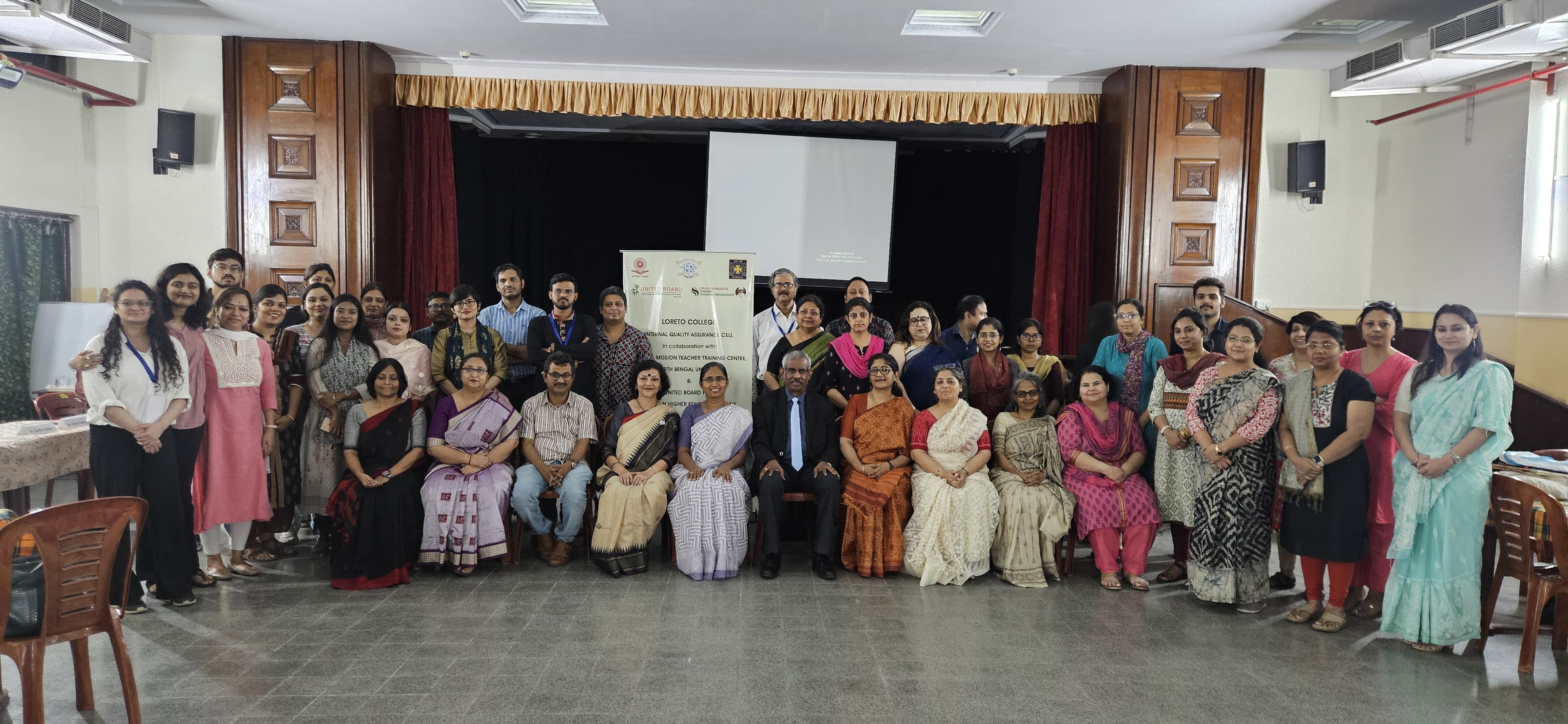Loreto College Hosts Week-Long Faculty Development Programme Focused on Excellence in Higher Education
Loreto College, Kolkata, in collaboration with the Malaviya Mission Teacher Training Centre (MMTTC) of North Bengal University and the United Board for Christian Higher Education in India, successfully hosted a Faculty Development Programme (FDP) from September 15 to 20, 2025. Titled "Capacity Building for Enhancing Excellence in Higher Education: Aligning Teaching Practices with NEP and NAAC Guidelines," the programme was organised by the Internal Quality Assurance Cell (IQAC) of Loreto College, with Dr. Kaustuva Banerjee as the convenor. The week-long event aimed at empowering educators with the skills and frameworks necessary to navigate and implement recent educational reforms in India in a transformative way.
The proceedings were inaugurated by Dr. Lakshminarayan Satpati, Director of UGC-HRDC at the University of Calcutta, who congratulated Loreto College for its sustained efforts to adapt to India's ambitious higher education goals and industry needs. Dr. Maher Spurgeon, Director of South Asia Programs, United Board, and Sr. Dr. A. Nirmala, Teacher-in-Charge, Loreto College, also addressed the gathering, advocating a holistic, student-centric approach to education that balances academic rigour, skill training, service learning, and personal development.
The programme brought together faculty members from various colleges and disciplines across Kolkata, creating a dynamic space for exchange and collaboration. The diversity of participants enlivened the discussions, bringing varied institutional contexts and pedagogical experiences into conversation. The participants and the speakers joined forces to identify common challenges in curriculum design, student engagement, and institutional assessment and propose creative solutions.
A series of stimulating sessions by Dr. Spurgeon, Dr. Vijay Solomon (Assistant Professor, Madras Christian College), and Dr. Sandra Joseph (Program and Assessment Officer, United Board) covered critical themes such as the psychology of learning, outcome-based education, leadership training, and the role of research for social good. The resource persons encouraged the attendees to move beyond traditional methods and adopt strategies that focus on student learning outcomes, real-world relevance, and values-based education. Sessions led by Dr. Debasri Banerjee (Professor, University of Calcutta) and Dr. Samata Biswas (Assistant Professor, The Sanskrit College and University) subsequently offered fresh takes on teaching practices and pedagogy in the higher education context.
A virtual session by Dr. Hope Antone (Director of Faculty Development, United Board, Hong Kong) introduced the key concept of Whole Person Education-a holistic approach that considers students' intellectual, spiritual, and ethical growth. The practical dimensions of this theme were further explored by Dr. Samrat Bhattacharjee (Associate Professor, Scottish Church College) and Dr. Nithila Devakarunyam (Principal, St. Christopher's College). Dr. Alphy Geever (Assistant Professor, St. Stephen's College) also drew attention to the practice of Slow Looking-an intentional, mindful way of engaging with texts, visuals, and ideas. She demonstrated how this contemplative approach can enhance observation, critical thinking, and deeper learning across disciplines, serving as a form of resistance to the culture of haste and surface-level learning that often infiltrates the modern educational landscape.
Entrepreneurship, innovation, and sustainability were brought into focus by Prof. Subhadip Basu (Professor, Jadavpur University) and Dr. Mona Khare (Director of UGC-MMTTC at National Institute of Educational Planning and Administration, New Delhi). Prof. Basu stressed the role of computational thinking and digital tools in building entrepreneurial mindsets, while Dr. Khare linked educational finance and institutional planning with sustainable development goals (SDGs), calling for a strategic alignment of policy, pedagogy, and purpose.
On the final day, Dr. Anjan Chakrabarti (Professor-Director, MMTTC, North Bengal University) and Dr. Indrila Guha (Principal, Basanti Devi College) outlined strategic ways to align institutional goals with NEP guidelines and NAAC accreditation frameworks. Drawing on their extensive experience, they offered practical strategies for quality enhancement and continuous improvement, focusing on leadership, documentation, and visionary planning.
Throughout the week, participants actively engaged in hands-on activities centred around the 4Cs of 21st-century education-Communication, Collaboration, Creativity, and Critical Thinking. From brainstorming sessions and group work to reflective exercises, these activities encouraged faculty to rethink their roles as educators and facilitators of learning. Their collective efforts culminated in action plans aimed at advancing student development, institutional excellence, and social welfare. At the end of the programme, participants walked away not just with new knowledge, but with renewed energy and a freshly forged sense of community and shared purpose.

 ANNOUNCEMENTS
ANNOUNCEMENTS
 ANNOUNCEMENTS
ANNOUNCEMENTS
